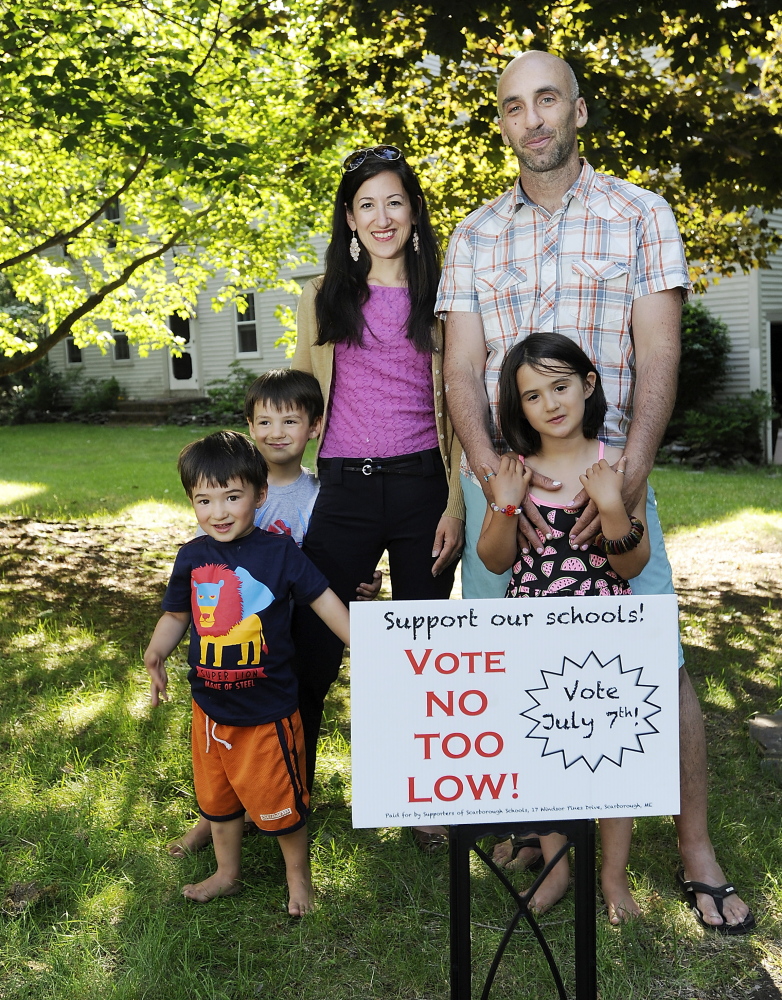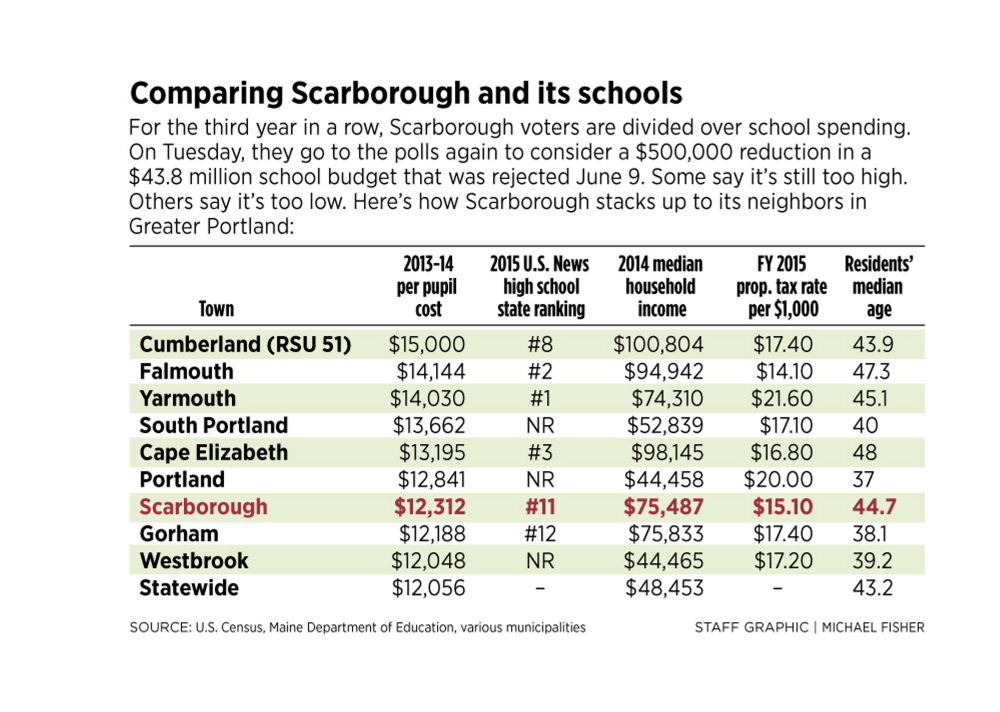For the third year in a row, and the fourth time in eight years, Scarborough voters are battling over school spending. And judging by high voter turnout and caustic comments on social media, the divided camps appear to be more impassioned than ever before.
A month ago, they soundly rejected a $43.8 million school budget for the fiscal year that started July 1. An impressive 20 percent of registered voters cast ballots, with the vast majority indicating on a nonbinding advisory question that it was too high.
Town voters will head to the polls again Tuesday to consider a $500,000 reduction that’s also expected to fail, since both sides have mounted opposition campaigns with dueling slogans, “Vote No, Too Low” and “Vote No, Still Too High.” Again, the advisory vote on whether the latest proposal is too high, too low or just right will inform the Town Council’s next steps.
Meanwhile, Scarborough’s neighbors in South Portland, Portland and beyond regularly approve larger school budgets with higher per-pupil costs that generate little consternation or controversy, draw low voter turnouts and usually require one referendum.
So what’s going on in Scarborough that makes passing a school budget an increasingly volatile process? Two major factors are rising property values and shrinking state education aid, which together are driving up property taxes.
Polarizing rhetoric has Scarborough’s schools at a precipice and fixed-income seniors on the verge of fleeing, especially if they have desirable ocean views. Communication blunders by school and town officials, combative social media websites and a shifting town culture have also contributed to the growing din.
“We’re dealing with the changing nature of Scarborough,” said Jean Marie Caterina, a town councilor. “We were a sleepy little town that has grown and changed over the years. We’ve had an influx of people with different values and different ideas about what people should get for their taxes.”
HIGH INTEREST, CHANGING NUMBERS
Interest in the school budget and Tuesday’s referendum was high heading into the July Fourth holiday weekend.
By Thursday afternoon, Town Clerk Tody Justice had handed out 1,037 absentee ballots and received 914 completed ballots, surpassing a record 888 absentee ballots cast during the June 9 school budget referendum.
Also on Thursday, Scarborough officials learned that the town will receive $4.6 million in state education aid this year – $884,890 more than expected and nearly the same as last year, according to the Maine Department of Education website. Town officials developed the school budget with a conservative $3.8 million aid estimate, in part because Gov. Paul LePage and the Legislature were so late in passing a biennial state budget.
The additional state aid has been earmarked for property tax relief, so the Town Council would have to decide to spend it otherwise.
The council approved the $500,000 or 1 percent school budget reduction after voters rejected the $43.8 million proposal that was up $1.8 million or 4.3 percent.
The vote was 1,719 to 1,408 against the initial 2015-16 school proposal. On a nonbinding companion question, 1,761 voters said the budget was too high, 619 said it was too low and 710 said it was just right.
With the initial school budget, the property tax rate for both municipal and school services would have increased 87 cents or 5.78 percent, from $15.10 to $15.97 per $1,000 of assessed value. That would have added $261 to the annual tax bill on a $300,000 home.
With a $500,000 reduction, the tax rate would increase 72 cents or 4.75 percent to $15.82 per $1,000, which would add $216 to the same tax bill.
That’s still too high for Councilor Edward Blaise. He initially sought a $2 million reduction but ultimately supported the $500,000 cut, along with councilors Shawn Babine, Peter Hayes and Chairwoman Jessica Holbrook. Caterina and William Donovan opposed the cut, and Katherine St. Clair was absent for the vote but had supported it at a previous meeting.
“Taxes are too high in the town of Scarborough, and every year they climb higher, and the big driver is the schools,” said Blaise, who has suggested repeatedly that the district’s teachers give up negotiated raises to save $616,000.
CONTRIBUTING FACTORS
A former IBM manager from Vermont who retired here 17 years ago, Blaise said the annual tax bill on his Higgins Beach home assessed at $820,000 has increased from about $3,500 when it was built in 1998 to more than $12,000 today.
But it’s not just his tax bill that troubles him.
“Taxes are too high for everybody,” Blaise said. “Taxes shouldn’t be going up more than 1.5 to 2 percent per year.”
And just because the state has reduced education aid doesn’t mean property taxpayers should make up the difference, even if the town’s property valuation has exploded in recent years, Blaise and other school spending critics said.
Since 2009, the town’s annual share of state education aid has fallen $1.7 million, from $6.3 million to $4.6 million, and the town’s valuation has increased $200 million, from $3.5 billion to $3.7 billion, because of commercial and residential development.
During the same period, enrollment in town schools has fallen from 3,355 to 3,110, according to the state education department. And still, the town’s per pupil cost in fiscal 2015 – $12,312 – was one of the lowest in Greater Portland and just above the state average, $12,056. The town’s median household income – $75,487 – and residents’ median age – 44.7 – also put Scarborough in the middle of the pack demographically.
Meanwhile, budget critics frequently point out that Scarborough’s annual tax levy for schools has increased $10.2 million in six years, from $28.1 million in fiscal 2011 to $38.3 million in fiscal 2016, after the $500,000 reduction. This year’s proposed levy is up $2.4 million or 6.8 percent from fiscal 2015.
‘CAN YOU DO THE SAME?’
Andrew Gwyer is one voter who expects school and town officials to do better. He’s semiretired after 23 years in the Navy and has two kids in town schools. He’s frustrated that the $10,000 annual tax bill on his $654,000 Higgins Beach home now eats up one-fifth of his yearly pension.
“I understand every year things get more expensive,” Gwyer said. “My question to the powers that be that drive me to make budget constraints is, ‘Can you do the same?’ ”
It doesn’t help when town or school officials talk down to agitated taxpayers, Gwyer said, or when the school department uses its emergency robocall system to encourage parents to support the school budget.
To promote open dialogue, Gwyer started a Facebook page in 2013 – “Concerned Taxpayers of Scarborough” – that’s one of three Web pages managed by local school budget critics. All have been busy this budget season.
Posts are strongly anti-tax, which is understandable in a town where three of its four state legislators are Republicans. Some commenters openly accuse town and school officials of corruption, question their intelligence or call for their removal.
“People tell me, ‘Thank you for giving us a voice. We used to just sit back and take it,’ ” Gwyer said.
SHOCKED BY ‘VITRIOL’
Stacey Neumann is among the voters who are fighting to preserve school funding. After the council approved the $500,000 reduction June 24, she started a private Facebook group to oppose the cut. In a few days, “Supporters of Scarborough Schools” had more than 1,100 members.
Neumann is a lawyer and mother of three whose eldest just finished kindergarten. She and her husband, Noah Perlut, a university professor, moved to Scarborough in 2009 for its schools. While they can afford a nearly $5,500 tax bill on their $339,000 home on Windsor Pines Drive, Neumann said she believes the town should find a way to help residents who truly can’t afford an increase.
Neumann made “Supporters of Scarborough Schools” a closed Facebook group because she saw inaccurate information on a similar open page, “Save Scarborough Schools.” She also wanted to avoid the negativity promoted by some budget critics, including a campaign sign that showed a pig vomiting money.
“Of all the issues to generate such vitriol, I was shocked,” Neumann said. “To view our kids as a burden is mind blowing to me. At some point I think you have to realize that when you vote down the school budget, you’re hurting kids.”
Copy the Story Link
Send questions/comments to the editors.





Success. Please wait for the page to reload. If the page does not reload within 5 seconds, please refresh the page.
Enter your email and password to access comments.
Hi, to comment on stories you must . This profile is in addition to your subscription and website login.
Already have a commenting profile? .
Invalid username/password.
Please check your email to confirm and complete your registration.
Only subscribers are eligible to post comments. Please subscribe or login first for digital access. Here’s why.
Use the form below to reset your password. When you've submitted your account email, we will send an email with a reset code.